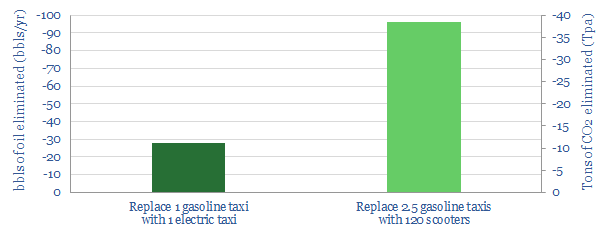Electric Cars are being overtaken by new electric vehicles, which achieve c3x greater decarbonisation per unit of battery material. This metric matters if one believes that battery materials are a limiting factor in the energy transition. To illustrate our case, our new Excel-file models two scenarios…
In the first scenario, 400kg of battery materials can be used to produce 1 electric vehicle, which displaces 1 gasoline taxi. The calculations show that 28 bbls of oil-equivalent energy and 12T of CO2 emissions are avoided each year.
In the second scenario, 400kg of battery materials can be used to produce 120 electric scooters, which displace 2.5 gasoline taxis. The calculations show that 96bbls of oil-equivalent energy and 37T of CO2 emissions are avoided. I.e., the scooters achieve 3x more decarbonisation than the electric car.
Moreover, our numbers above only assume that one-in-three scooter trips displaces a car-trip, while the other two-in-three are deemed to be “new demand”. Per mile travelled, the scooters achieve 9x more decarbonisation than putting the same 400kg of battery materials into the electric car.
Please download the data-file to interrogate our assumptions and stress-test your own scenarios. We argue the “electric revolution” goes beyond replacing today’s ground cars with electric ground cars. The opportunities are in new vehicle types.
